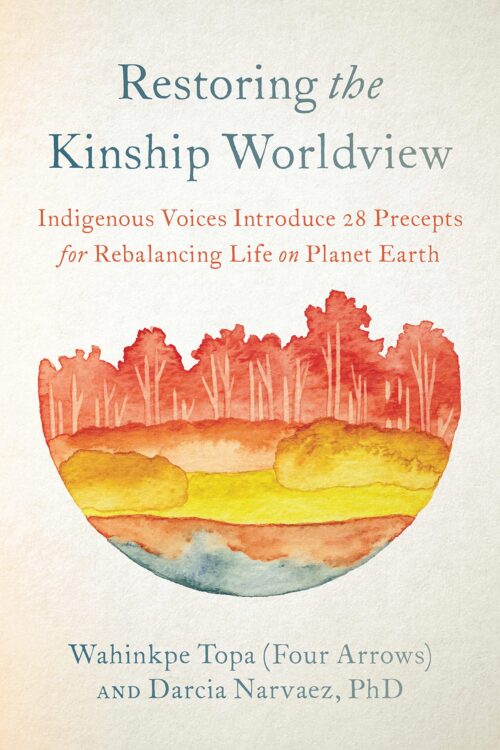Our Millions Year-Old Embodied Wisdom: Indigenous Worldview, A Video With Darcia Narvaez and Four Arrows
About Kinship and Indigenous Worldview
Most philosophical positions are rooted in western enlightenment assumptions of human superiority to and separation from nature, the notion of human cultural progress, and individualism—all part of what anthropologist Marshall Sahlins called the ‘western illusion of human nature.’ Virtually all prior and contemporaneous cultures had a different orientation, one of human interconnectedness and partnership with the biocommunity and a cyclical panpsychism. Social anthropologist Robert Redfield concluded that there are essentially two worldviews—a set of implicit assumptions that guide one’s values, philosophy, and attitudes towards life. We name these the dominant and the Indigenous worldviews.
The dominant worldview considers the cosmos fragmented, amoral and disenchanted and has led to the disruption of ecological systems, including child development, worldwide. The dominant worldview is seeded by toxic early experiences of disconnection and distress, leading to a psychological splitting of self from others, fostering a self that is easily hypnotizable by authoritarian ideas, and making the detached dominant view seem logical and true. The dominant worldview has led to the demise of biodiversity and cultural diversity.
The Indigenous worldview considers the cosmos interconnected, moral and sacred, and is associated with greater biodiversity preservation. The Indigenous worldview and corresponding philosophy represent the longest empirical “experiment” ever done in biodiverse and culturally diverse settings. The San Bushmen have been in existence for at least 150,000 years. This worldview along with Traditional Ecological Knowledge (TEK) of how to live responsibly-in-place is credited for the majority of biodiversity still in existence (according to a recent UN report, 80% of the biodiversity is held on the 20% of land controlled by Indigenous Peoples).
The Indigenous worldview of interconnection and circular effects, sentience and cooperation among natural systems, is supported by scientific evidence today, from physics to biology.
We present forty precepts showing the contrasting worldviews and how the Indigenous worldview supports biodiversity and the dominant worldview does not.
Watch the video with Darcia Narvaez and Four Arrows
Download the Worldview Chart by Four Arrows
This chart is not intended as a rigid binary, but a true dichotomy best viewed as a continuum. It is meant to encourage seeking complementarity and dialogue. Absolutism is discouraged with the realization we are all participating in DW precepts to some degree. The chart assumes that all diverse cultures, religions, and philosophies can be grouped under one of the two worldviews. “Indigenous Worldview” does not belong to a race or group of people, but Indigenous cultures who still hold on to their traditional place-based knowledge are the wisdom keepers of this original Nature-based worldview. All people are indigenous to Earth and have the right and the responsibility to practice and teach the IW precepts. All have the responsibility to support Indigenous sovereignty, dignity, and use of traditional lands.
For non-Indians who are concerned about misappropriation, see the peer reviewed article,
“The Indigenization Controversy: For Whom By Whom.”
Worldview Chart and introduction by Wahinkpe Topa (Four Arrows), a.k.a. Don Trent Jacobs, Ph.D., Ed.D. Originally published in The Red Road (chanku luta): Linking Diversity and Inclusion Initiatives to Indigenous Worldview, 2020. Featured inRestoring the Kindship Worldview, 2022, by Four Arrows and Darcia Narvaez, Ph.D. Find Four Arrows and more on Indigenous Worldview at www.KindredMedia.org
Kindred Worldview Chart Starry Night Background in PDF format: Download
Kindred Worldview Chart Starry Night Background in PNG format: Download
Kindred Worldview Chart in black and white for printing in PDF format: Download
Kindred Worldview Chart in black and white for printing in PNG format: Download
Wahinkpe Topa (Four Arrows), AKA Don Trent Jacobs, is currently a professor in the School of Leadership Studies at Fielding Graduate University. A made-relative of the Oglala Medicine Horse Tiospaye, he served as director of education at Oglala Lakota College on Pine Ridge where he fulfilled his Sun Dance vows. Named one of 27 “visionaries in education” by the Alternative Education Resource Organization, and recipient of a Martin Springer Institute’s Moral Courage Award for his activism, he has authored/edited 20 books and numerous chapters/articles on Indigenous worldview.



